One step at a time for Arianna Simpson
Nearly 3 years ago, Arianna Simpson lost her ability to walk. Today, her struggles have become her motivation to live life to the fullest and to never take anything for granted.
TOWAMENCIN — After going through what seemed like any other panic attack one day, North Penn High School junior Arianna Simpson never realized how much her life would change after that.
Simpson was at youth group in May of 2018 when she began to have a panic attack. Prior to this, she had already been diagnosed with anxiety, so it wasn’t something that was unfamiliar to her; however, the panic attack turned out to be worse than what she had expected it to be.
“It was so severe that my brain didn’t trust itself anymore, so the signals that were getting sent to my body to be like ‘hey, walk, move your feet’ weren’t working because my brain was like ‘we don’t trust you anymore, you put us in danger.’ The panic attack went on for three days which made my brain all crazy, so it basically made me unable to walk anymore,” explained Simpson.
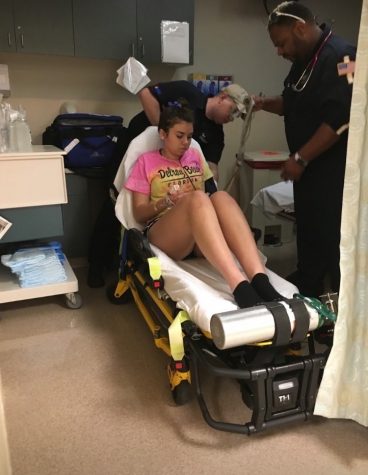
Simpson getting transferred from Grand View Hospital to CHOP.
“[The doctors] explained it to me as cartoon characters having a conflict like a villain and another villain having a conflict. [Her brain and the rest of her body] could not communicate well, and then I couldn’t walk,” added Simpson.
During the panic attack, she couldn’t breathe. When you hyperventilate, your carbon dioxide levels and oxygen levels become unbalanced, so you eventually pass out which is what happened to her.
“It was so severe that I thought that I was going to die. I thought that everyone was going to hurt me. The doctors were trying to put an IV in, and I thought that they were going to kill me because my brain was like ‘you’re in danger, you’re in danger, everything is going to hurt you.’ It’s very scary when your brain is telling you that you’re going to die even though people are trying to help you,” said Simpson.
Unlike any other panic attack where it is easier to get under control through something that is relaxing, this specific panic attack was more difficult to deal with. Her mom immediately had to bring her to the emergency room, and she was in and out of the emergency room for 3 days.
At first, the doctors believed that it was just a regular panic attack that was harder to get under control, so they gave her medication that had the possibility of causing a rebound effect in most people. A rebound effect is when the effects of the medication have passed and the symptoms that were controlled while taking the medication have re-emerged. The medication could either help the panic attack or make it worse. For Simpson’s case, it made it worse.
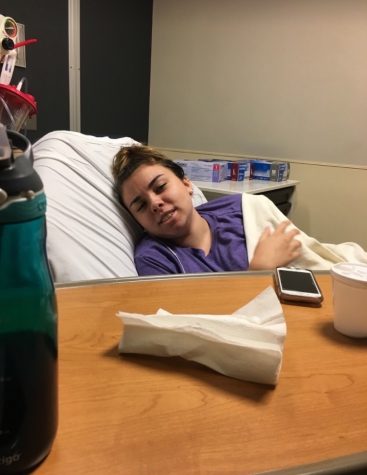
Simpson during her second ER trip where she was given medication the second time before she was later brought to CHOP.
“When we went to the ER the first time, they gave me medication and sent me home. Then I went to the ER the second time, and they gave me medication and sent me home. Then the third time, I had to go to the ambulance because I was unresponsive because I passed out for so long. They said that it was a little more than they could handle, so they transferred me to CHOP, and they told me that I was going to the ER at CHOP, but once the neurologist heard what was going on, they had me go straight to the neurology floor and had me admitted for four days,” explained Simpson.
“I was terrified because I thought it was a normal panic attack that I was just gonna get through, and I was also really grateful that doctors were so accepting because some doctors don’t believe in mental health and that it can affect your physical health. I was terrified because I didn’t know what was going on but grateful because the doctors were like ‘this is a mental health issue that’s affecting you physically and we’re going to figure out what’s going on,’” said Simpson.
When the time came to tell others about what had happened, Simpson was encouraged by her mom to tell other people and to educate them about mental health. Sadly, she received some negative reactions due to the fact that mental health is still a controversial subject for many people. At the same time, she learned inspiring stories from other people which helped her through the process.
“It was inspiring for me to be able to go out and share my story even more because then those other people can be inspired, and we could spread awareness of mental health and show how important it is,” said Simpson.
While this was happening, she had already been doing cyber school, so it didn’t have much of an effect on her school life. She would finish school early, so she rarely missed any work.
As for treatment, it consisted of days of physical therapy. Once she came home from the hospital, she went to one of the specialty cares that they had.
“Every day I was going to physical therapy, and I was just moving my legs and telling them ‘hey, it’s okay. You can walk.’ I had a gait belt which is basically like a leash where it goes around your stomach, and they hold onto the back, so in case you get wobbly and fall, they can hold onto you. I was basically just walking laps and laps and laps and just moving my legs the way they were supposed to and trying to retrain my brain and my body to be in sync again,” said Simpson.
For Simpson, the hardest part about the training was the repetition. Walking is a skill that nearly everyone learns when they’re just a child, and for her to have to learn it all over again was a struggle she had to deal with daily.
“It was hard knowing that [walking] is a basic skill that I knew how to do, and I couldn’t physically do it. Everyone learns how to walk when they’re younger than 1, and I was 15 learning to walk again. It was really frustrating looking at people and being like ‘I used to be able to do that,’ but my brain is just not working,” said Simpson.
Everyone learns how to walk when they’re younger than 1, and I was 15 learning to walk again.
— Arianna Simpson
It took a long time until Simpson felt like herself again. Seeing everyone else walking made her angry at first, but as time went on and she began to regain her strength, she started to feel grateful for everything that came through her path.
“At first, I was angry that I couldn’t walk anymore because it should be a basic thing, but then as I was sitting there and thinking about it and then as I was eventually able to walk again, every step I took, I would thank my body. Knowing that this could be taken away from me in a single moment, I was so much more grateful for every step I was able to take. I was so much more grateful for everything that I was able to do like jumping on a trampoline or running. Every little thing became a celebration in my brain because I am able to do this and some people won’t be able to do this for the rest of their lives,” said Simpson.
Knowing that this could be taken away from me in a single moment, I was so much more grateful for every step I was able to take. Every little thing became a celebration in my brain because I am able to do this and some people won’t be able to do this for the rest of their lives
— Arianna Simpson
In addition to being unable to walk, Simpson had difficulty processing things. You would have to repeat things a few times for her to understand.
“I was watching Bubble Guppies because that was the only thing that my brain was able to follow. My brain was thinking at a level of a 5-year-old,” said Simpson
She also had tremors, so when she had to do things like holding a spoon or cup, she would begin shaking. When she walked, she would misplace her steps because she would be shaking. She would have to get assistance from her siblings or her mom most of the time.
It took roughly 4 months for her to be able to move on her own. As for her mindset, it’s still a daily battle that she has to fight, but she is much better than she was previously.
Simpson refused to allow her inability to walk to get in the way of living her life to its complete potential. It inspired her to try out for her previous school’s musical, and she got the leading role of Mrs. Hannigan from Annie.
“I was always so scared of the judgment, but I was like some people can’t do this, and I may not be able to do this tomorrow, so I might as well do it,” said Simpson.
She was also able to go to the beach and not care about what people thought of her or confidently sing in front of others. Being able to talk about her story allowed her to also be more comfortable in her speaking skills.
“Before, I took a lot of things for granted, but now I just try to live every day as if it’s my last,” said Simpson.
Before, I took a lot of things for granted, but now I just try to live every day as if it’s my last
— Arianna Simpson
The process of getting through everything was hard, but with the help and support of her friends, family, and church, she was able to get through the hardest parts of the experience. They were always there for the good and bad days, and she was always able to lean on them for additional support.
As of now, Simpson has been recently diagnosed with an unknown autoimmune disease. She had always dealt with constant fatigue, so she had just gotten bloodwork done where she got the news. Because there are more than 100 types of autoimmune diseases, the doctors were unable to figure out what she had since her symptoms were unique. Currently, she has been doing home-bound education and has been out of school for 6 weeks because the size of the North Penn High School is overwhelming.
“Walking is really tiring, and it’s been affecting my brain, so coming up with words and retaining information is really difficult. There’s a special clinic at CHOP that will hopefully be able to diagnose me, but they see people from all around the world, so they may not be able to see me until May 1st,” said Simpson
Simpson believes that everything happens for a reason, and this is no exception.
“I don’t think anything is by chance. I think that this experience that I had was there to make me stronger as a person. It was a hard push, but it was a push in the right direction,” said Simpson.
I don’t think anything is by chance. I think that this experience that I had was there to make me stronger as a person. It was a hard push, but it was a push in the right direction
— Arianna Simpson
Had she not had this happen to her, Simpson believes that she would not be as grateful as a person as she is today.
“Before everything had happened, I wouldn’t say that I was a selfish person, but I definitely didn’t do everything I could for other people. After that, I realized that my life can be used to help other people, and I don’t have to be this selfish person that’s always thinking about me. I want to focus on first making sure that I’m okay and then helping other people and realizing that I have so much, and other people don’t have anything. I just want to be grateful for everything I have and be grateful that I am somewhat able to help other people,” explained Simpson.
“I am thankful that I get to brush my teeth today; I am thankful that I woke up; I am thankful that I got to walk out of bed; I am thankful that I got to put on clothes or my bag. I am constantly having this inner dialogue of just saying thank you for every single thing that’s as simple as tying my shoe and just saying thank you to other people because I don’t think a lot of people get the things that they deserve. When I was in school, I took the time to thank the custodial staff that was here because they don’t ever get a thank you or a smile or thanking the security guards because they deal with a lot of crazy stuff every day,” said Simpson.
I am constantly having this inner dialogue of just saying thank you for every single thing that’s as simple as tying my shoe and just saying thank you to other people because I don’t think a lot of people get the things that they deserve.
— Arianna Simpson
Although her losing her ability to walk and now having been diagnosed with an autoimmune disease makes up a large portion of her life, she is more than all of that. For starters, she loves to sing and to play the ukulele, and she hopes to learn how to play the guitar and piano one day. She also enjoys spending time with younger kids. At church, she’s the director of the music program where she finds all of the songs for performances that they have.
As for life after high school, her dream is to work as an English teacher at a bilingual school in New York. She is currently learning Spanish and is planning on majoring in it in college.
“I think a lot of literature comes out of pain, so I want to teach kids that are not in a situation that most kids are able to be put in to use their pain to make something beautiful,” said Simpson.
As for going back to high school, Simpson will need to get a few adaptations, so her experience will be easier. She’ll start with half days and will eventually move up to full days.
Pain is just a part of life. For Simpson, she’s grateful for everything even all of the negatives because they have made her the person she is today.
I am not my struggles, but they are still a part of me.
— Arianna Simpson
“Everyone is bigger than their struggles, but the struggles are still a part of them, and they should be grateful for them. That’s something that I had to learn-being grateful for things many people are not, being grateful for the negative things in my life and the awful things that’s happened and using them to make me stronger. I am not my struggles, but they are still a part of me,” said Simpson.


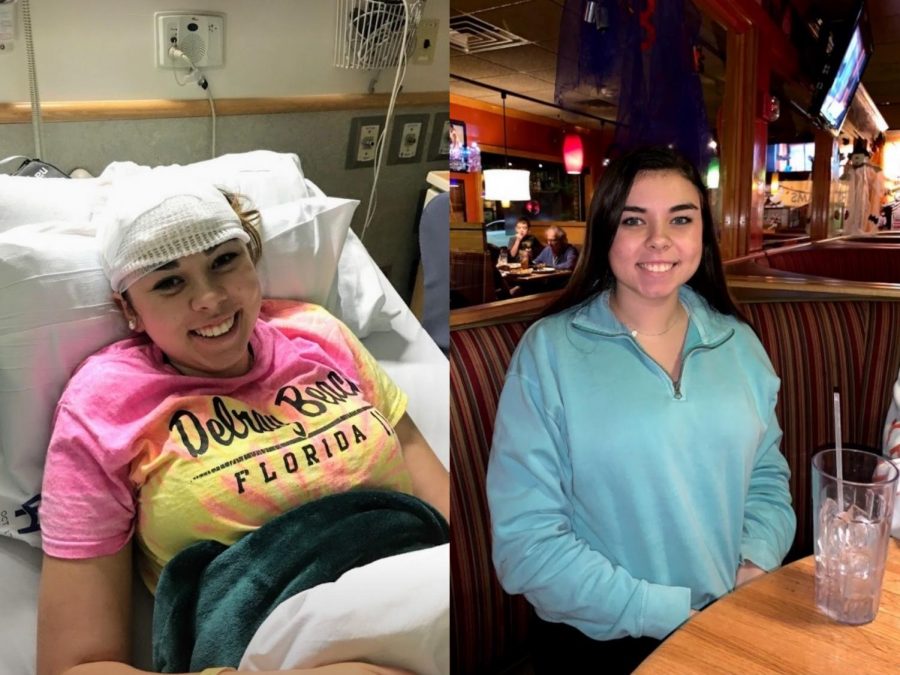

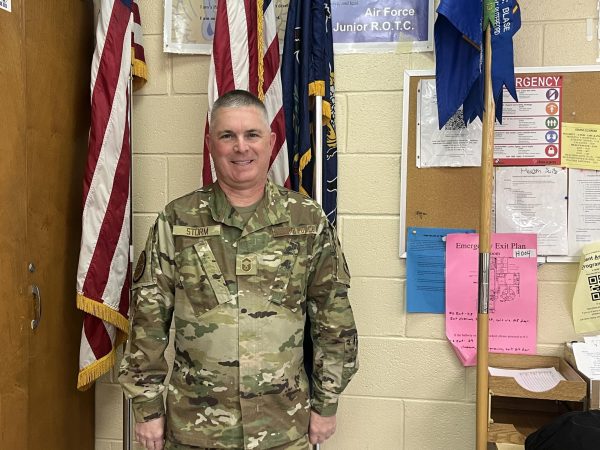





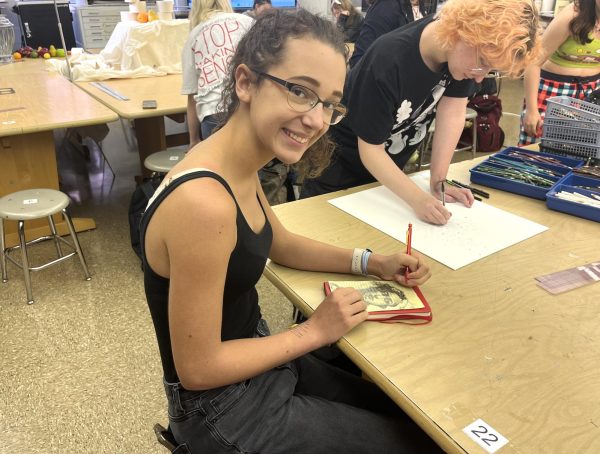
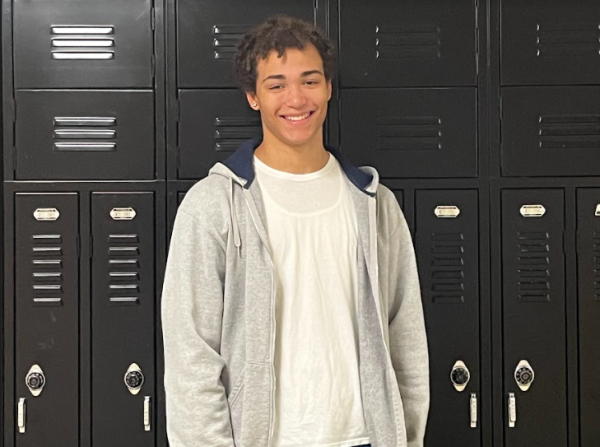

Emma Underwood • Mar 6, 2020 at 8:11 am
your story is something that is really inspiring to others and me. God can do great thing to others and put struggles in your life to show you something. i am glad that you are doing better now. i hope you keep moving forward from here and you will be in my prays 👐.
Danielle • Mar 6, 2020 at 12:36 am
Wow – what an inspiring story! Thanks for sharing Arianna!